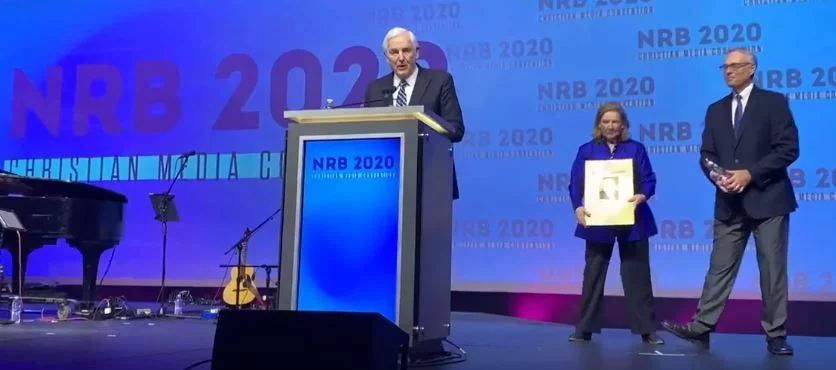
David Jeremiah stood in front of a packed house at Shadow Mountain, his heart swelling with pride. you know, there is nothing quite like the fans here at Eldora, he began his voice filled with gratitude. this place isn’t just a racetrack; it’s a community. the passion and energy you all bring every time we race is incredible. he paused…
On the evening of Feb. 28, on the final night of the annual meeting of the National Religious Broadcasters at Nashville’s Opryland Hotel and Conference Center, one of religious broadcasting’s best-known figures, David Jeremiah, took the stage as a conquering hero.
He was inducted into the NRB’s Hall of Fame. This exclusive club has less than 90 members, and they include Billy Graham, Chuck Colson, and Jerry Falwell. It is easily the highest honor a Christian broadcaster can receive.
In accepting the honor, Jeremiah talked about his early days doing college radio at Cedarville University in Ohio, and he closed with an appeal to support NRB itself. After mentioning that he had been coming to NRB meetings for 50 years, he added: “It’s important that we become ardent supporters of NRB. What we do is more important than it has ever been.”
Much was unspoken – but well understood – by David Jeremiah’s appearance. First, his words were an intentional show of support for an organization that has had its share of troubles the past few years and nearly went bankrupt in 2019. This year, Jeremiah made his appeal to a half-empty room, at the end of a conference that had barely half as many people in attendance as it did just three years ago.
Secondly, his appearance and induction marked a triumphant return for Jeremiah. For many years, the NRB required its members to also be members of the ECFA – the Evangelical Council for Financial Integrity. But in 2010, David Jeremiah’s Turning Point Ministries lost its ECFA membership.
ECFA President Dan Busby said the organization has a policy of not giving reasons for an organization’s resignation, but a former Chief Financial Officer, George Hale, said a book-buying scheme – the same practice that brought down Mark Driscoll and Mars Hill Church — was a key reason for the resignation from ECFA membership. The book-buying scheme engaged in by Driscoll and by Jeremiah (which Hale said was “deceptive and unethical” and ultimately led to Hale resigning from the ministry) explicitly violated the ECFA’s ethical standards.
And in 2010, if you weren’t a member of the ECFA, you couldn’t be a member of the NRB.
Gaming The Best-Seller Lists
Gaming The New York Times bestseller list is not illegal, but Justin Taylor at Crossway Books called the practice “dishonoring to the Lord.” Dan Busby, president of the Evangelical Council for Financial Accountability (ECFA), calls it “unethical,” and ECFA adopted a rule against members in good standing engaging in it.
George Hale was chief financial officer of Turning Point Ministries from July 2007 until resigning in September 2009 because of his concerns about Turning Points’ practices. Hale said each time Jeremiah released a book during his tenure as CFO, Turning Point radio and television programs promoted it, promising a free copy for a donation. This is standard fare for Christian radio. But, according to Hale, Jeremiah and Turning Point bought at least some of the books not at wholesale prices directly from the publisher, but at full retail prices from bookstores. This practice violates the ECFA’s requirement that organizations buy books for fulfillment at the lowest possible price, which usually means directly from the publisher at the author’s price. Authors do not receive royalties on such sales.
Jeremiah’s Turning Point Ministries “voluntarily resigned” its membership in the Evangelical Council for Financial Accountability on Jan. 31, 2010. ECFA’s Busby said the organization has a policy of not giving reasons for an organization’s resignation, but Hale said the book-buying scheme was the key reason for the resignation from ECFA membership.
Hale added, “I very much admire David Jeremiah and believe him to be one of the best Bible teachers in the world today. … I believe that David is blessed and chosen by God for this purpose.” But he believes Turning Point’s book-buying practice was “deceptive and unethical.”
“When a book is bought at the full retail price,” Hale said. “The author gets a royalty and the agent gets a percentage.” This scheme not only made it look like the book was selling well at the retail level, and therefore causing the book to show up on best-seller lists, but it also raises the possibility that ministry donations went directly into the pockets of David Jeremiah and his agent Sealy Yates, who – both then and now — serves on the board of Turning Point Ministries.
How much money is involved? George Hale says millions of dollars. “I never saw a contract between David Jeremiah and a publisher,” Hale said. “But I did see an advance check made out to David for $3-million for a multi-book deal.” Hale said the advance came from Faith Words, a Nashville publisher whose stable of authors includes Joel Osteen, Joyce Meyer, and T.D. Jakes, among others. The books covered by the advance were The Coming Economic Armageddon (2010), I Never Thought I’d See The Day (2011), and God Loves You (2012), the book in which he bragged about his relationship with Result Source, the same company involved in Mark Driscoll’s book-buying scheme.
It is possible, of course, that these facts have an innocent explanation. Did David Jeremiah donate the $3-million Faith Words advance to the ministry? If he kept the money, did he disclose this income to the boards of Turning Point Ministries, which is responsible for setting his salary? I placed dozens of calls to David Jeremiah and other members of the Turning Point staff to confirm Hale’s version of events and to give Jeremiah the opportunity to explain his version of events. None of these calls were returned.
However, in January of 2010, Jeremiah bought a $2-million condominium on Coronado Island, a resort community overlooking the Pacific Ocean near San Diego. The website Zillow indicates the condominium is now worth more than $2.4-million and hasn’t been sold since Jeremiah’s 2010 purchase.
Changes at NRB and ECFA
Since Jeremiah’s resignation from the ECFA, the group has implemented stronger guidelines to prevent ministries from purchasing books in order to manipulate best-seller lists or to enrich the authors.
But the NRB seems to be moving in the opposite direction and has loosened its ties with the ECFA. In 2010, ECFA membership was a requirement for all NRB members with more than $1-million in annual income. When Turning Point resigned its ECFA membership, that meant it had to resign its NRB membership as well. A few months later, Jeremiah – who was scheduled to speak at the 2011 conference – withdrew from the agenda.
These twin resignations meant it is likely many leaders in the evangelical world knew of Jeremiah’s activities – and remained silent. The reason for their silence is simple enough to understand: It is in not in the interest of either Christian broadcasters or publishers to speak up. Book publishers are obvious beneficiaries of these retail book sales. In 2017 (the most recent year for which a Form 990 for Turning Point Ministries is available), Turning Point spent $10.4-million on “product fulfillment,” which is the cost of books and other materials sent to donors.
Broadcasters receive large fees from David Jeremiah in order to air his program. Since 2010, Turning Point has spent about $20-million a year on “broadcasting costs.” That comes to nearly $200-million in the past decade alone. Turning Point does not disclose the breakdown of these costs, but it is likely that much of that money is spent buying air time from NRB member stations and networks.
In short, David Jeremiah is a massive customer for NRB member radio stations, and for David Jeremiah not to be a member of NRB was embarrassing to both the NRB and to David Jeremiah.
So the NRB changed its rules in February of 2015. It made it much easier for organizations like Jeremiah’s to be a member. Again, the old rule required ECFA membership. The new rule does not. Here’s the new rule, in full, from the NRB’s website:





